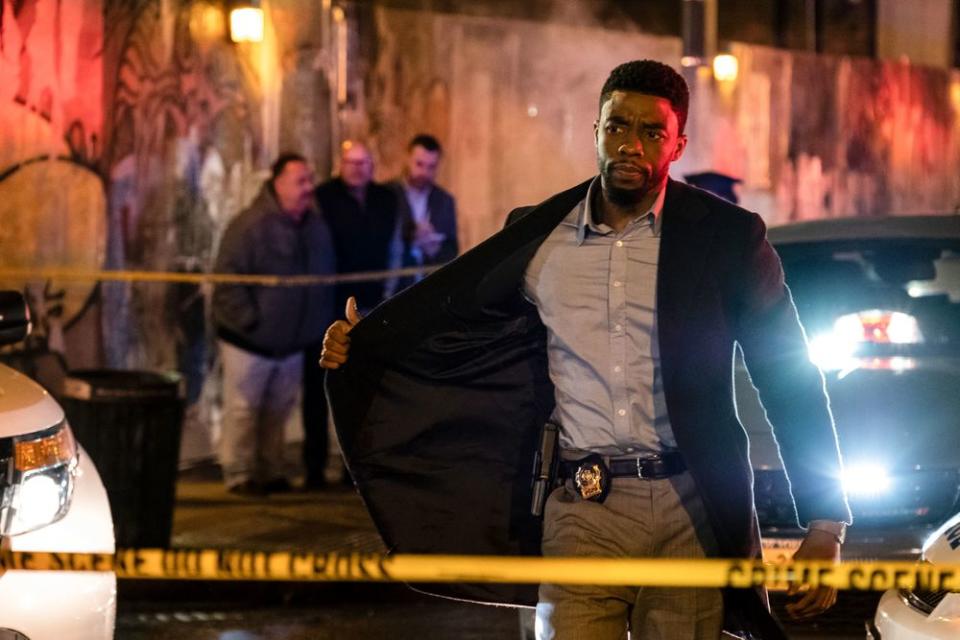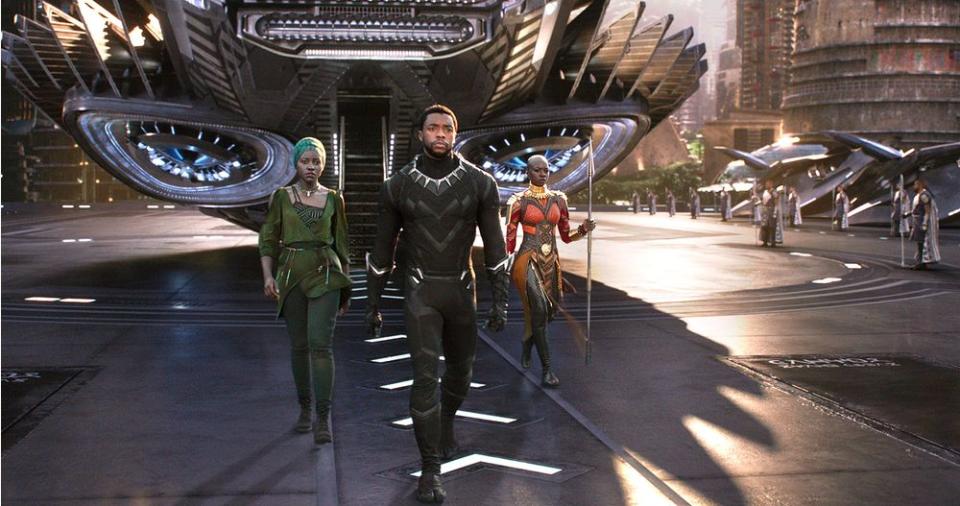Chadwick Boseman on balancing Marvel movies with bucket-list roles

As Captain America: The Winter Soldier neared its release in 2014, Chris Evans first expressed a sense of fatigue, the kind that comes from acting in superhero movies and only superhero movies. That’s probably why the actor isn’t so eager to work out a potential return for the star-spangled Avenger — even if he has more wrinkles than stars these days.
Chadwick Boseman isn’t in the same mental space. After the events of Avengers: Endgame, the Black Panther star emerged as one of the acting heavyweights set to carry on the Marvel movie legacy, especially after the billion-dollar success of his standalone superhero movie. But given that Marvel’s film and TV universe seemingly won’t require his services until the Black Panther sequel in 2022, Boseman is determined to maintain a balanced diet between his superhero duties and other bucket-list projects.

21 Bridges is one of the latter. The film, directed by Brian Kirk (Penny Dreadful) and produced by Endgame helmers Joe and Anthony Russo, stars Boseman as New York City Detective Andre Davis, who shuts down all the bridges in Manahttan to track down a pair of cop killers. In the same spirit as some of Boseman’s favorite thrillers, like Heat and The Fugitive, there’s more to this manhunt than initially thought. Stephan James, Sienna Miller, Taylor Kitsch, and J.K. Simmons also star.
With 21 Bridges in theaters Friday, Boseman chatted with EW about cultivating a more “fulfilling” career between Marvel and some of those other dream roles.
ENTERTAINMENT WEEKLY: How would you describe the past couple of years? Has it been wild? Fulfilling? Exciting?
CHADWICK BOSEMAN: Yeah, it’s very exciting, absolutely. It’s been wild at times, for sure. But it’s definitely fulfilling.
Do you have any downtime these days?
I don’t plan to shoot anything else for the rest of this year, but I think top of the year we’re going to start in on some things. Downtime time is the whole holiday.
You definitely deserve it after all these movies you’ve been working on.
Yes. I shot three this year. I was like, “That’s enough. Just find yourself again.” You know what I mean? [21 Bridges], because it was a producing opportunity, it was just right. It was just off of Avengers: Infinity War. We did the premiere night and the Russo brothers came to me with the script, so it kind of just flowed right into this. It was funny because I died [in Infinity War]. I think it was Anthony who walked up to me at the premiere. I was talking to Robert Downey Jr., he comes up, he’s like, “Hey, I got something for you.” And I was like, “What?” Not that I was mad! I thought I was coming back [as Black Panther]. But basically he was like, “We have a script.” And I said, “Oh, this is consolation for killing me, huh?”
The other projects were dreams come true, I would say, because [Netflix’s Da 5 Bloods] was an opportunity to do a movie with Spike Lee. I grew up watching these movies. I’ve always wanted to do one. The second opportunity [Netflix’s Ma Rainey’s Black Bottom] was an opportunity to do August Wilson, who is a playwright that I love and a playwright that I’ve studied in college and always wanted to do. I have never had an opportunity to do a full play on stage. Denzel Washington was producing it. So it was an opportunity to work with him. He was a collaborator. He wasn’t just a producer by name. He was there every day. So all the projects that I’ve done are based upon, you know, this is just something that I want to do.
Compared to when you were first getting started in this business, do you think your process about choosing which kind of roles and choosing which kind of stories you want to tell has changed?
No, that hasn’t changed at all. I think it’s maybe expanded just because there are new ways of doing it, meaning I have the opportunity to produce and not act. So that is a new thing. There’ll be opportunities where I write and maybe I act in it, and maybe I don’t. That’s what’s different. But what the stories are, it’s basically the same. I feel like it’s the same manifesto for me.
What is that manifesto?
Now that I can’t tell you, my friend. That’s way too much information.
When you talk about producing 21 Bridges, had you been actively looking to make more of a move behind the camera like that?
People don’t see what you’re doing on a day-to-day basis. So for me, being a storyteller is always about always having a story that I’m telling myself, that I’m telling inside my head. Even if I was doing [the Jackie Robinson movie] 42, it doesn’t mean I didn’t have ideas about other things I wanted to do. I’ve always wanted to produce. I came into this as a director initially, so it’s always been what I wanted. I’ve always operated [like that], even in situations where I didn’t get the credit. That’s what I was doing. If a line needed to be changed, saying like, “Hey, we might need to change this line because this works better.” Now I’m just getting credit for it. I’m getting credit for being an actor that wants to move the work, not just my part.
There are a lot of elements to 21 Bridges that make it exciting. The story tackles corruption within the police force, but then there’s a scene where you go down into the subway that reminded me of The French Connection and that classic era of low-to-mid-budget thrillers. When you were first presented with the script, what elements were most intriguing?
Well, that’s it. For me, this movie points to those movies that you mentioned. You said The French Connection. There’s a lineage of films after that and before that as well. This movie has those elements. It has the elements of the chase. So that’s like The Fugitive. Stephan was talking about how, in one instance, he was thinking of Tom Cruise running in movies. You feel those movies as you do them. I wouldn’t say that you watch them in order to try to achieve that, but I think, because it has feelings of Heat at times, it has a feeling of Mystic River to me in certain moments, it’s a faster-paced version. We’d be waiting for a shot or something, you go back to your trailer, you put those movies on because you feel like you’re making one of them. Just that style of movie that you don’t see anymore with antiheroes, that’s what I loved about the project from the beginning.
Do you think you’ve done as much running in this as Tom Cruise?
Not yet. No. No, no, not yet. He and Will Smith have done a lot of runs. I haven’t caught up to them yet, and they’re still right.
I was trying to keep an eye out for specific scenes that acted as certain homages. I’m curious if there were others you noticed while working on the movie.
Well, it’s hard for me to say without giving away the movie to a certain degree, but I feel Heat when I think of J.K.’s character. I don’t want to say the scene. Stephan on the step with the chase feels like you have the bits of a character you played before. I feel it when he’s running. It’s a movie that wants to be a crowdpleaser in that way.
I heard the script arrived to you in a more unfinished form. What were some of the conversations like around evolving your character?
The difference in my character was that he was more of a political arm than a person with a skill set who was meant to just use that. There was maybe a sense that he was working for the mayor or making sure that the mayor’s infants were in place.… The type of movie that would work here I felt was one where you still had the guy with the [moral] code who could make the decision on the street, because then you see what the full power of a police officer in the street is. He is judge and jury on the street, and his code is important because he should have that highest sense of justice. That’s what this movie felt like it was, as opposed to a movie about the politics of those cops being killed. You still feel that, but it needed to be a more physical journey.
Marvel movies these days come with a lot of commitments and multi-film contracts. In your own words, why is it still important for you to do some of these smaller, mid-budget movies, like 21 Bridges?
To be honest, when I accepted that I was supposed to act [as a profession], the last thing I ever thought about doing was with a superhero movie. You’re picturing yourself doing what you see the actors you love doing. The actors that I loved did these movies [like 21 Bridges]. You’re talking about Denzel Washington, Al Pacino, Robert De Niro, Tommy Lee Jones. You’re like, “This is the type of movie I want to do.” If you just do the superhero movies — which I love, I love the movies that we do — but if you don’t do the films that you plan to do, I think you wouldn’t feel fulfilled as an artist. I always wanted to make a movie that’s not “cool.”

After the thriller genre with 21 Bridges, is there anything now that’s on the top of your bucket list?
Well, yeah. [Laughs] But I don’t know if I’m gonna tell you. I want you to be surprised. Like what we talked about earlier, with the two that are coming up, I can tick off a particular type of movie on the bucket list. I’ve always wanted to have a play adapted to film, to be a part of that, but I want to keep people guessing. I want to make sure that they don’t see me coming.
Do you find it’s more exciting for you to take on roles that are just completely different from the previous characters you’ve done?
Yeah. At times it doesn’t have to be completely different. You can find a new challenge if something is similar, that’s for sure, because a lot of times you finish stuff and you wonder if you covered everything you could cover. There’s always something new to explore. But I do love the fact that we are finding things that are a challenge, that makes me have to learn a skill set that I didn’t know, or whatever it could be. You find a part of yourself that you didn’t think about.
Did you have that experience on 21 Bridges?
As far as skill set, I’m not a person that likes guns. I’ve never been a person that was guided into firing a weapon. I haven’t had really good experiences with them, so it was something to get over, to pick up a gun and go to the range and practice. We were firing live rounds. To practice with live rounds and do it day after day, three or four times a week, and then practice on multiple targets, cover, at first it didn’t feel normal. It didn’t feel comfortable for me because I couldn’t take away that you’re practicing to kill somebody. So, that was definitely something that I had to learn. Not just learn, but to get over in order to do the movie.
This interview has been edited for length and clarity.
Related content:

